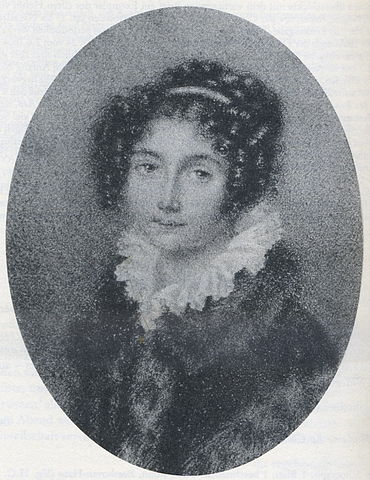Beethoven “very much enjoyed looking at women; youthful faces particularly pleased him,” according to his friend and pupil Ferdinand Ries. This does not surprise us.
In May 1799, Beethoven acquired two of his favorite type of piano student: young women of aristocratic background. These were the daughters of the widowed Hungarian Countess Anna Brunsvik: Therese (b. 1775) and her younger sister Josephine (b. 1779).
It was Josephine Brunsvik (shown here) to whom Beethoven was most attracted. However, Josephine was quickly married in June 1799 to the rather older Count Josef Deym (b. 1752) and commenced a short but fruitfully procreative marriage.

In May 1799, Beethoven wrote a unique composition for the Brunsvik sisters: WoO 74 is a setting of a two lines of a Goethe poem for two voices with piano four-hands accompaniment, followed by four variations on that tune, also for piano four-hands.
When Beethoven prepared the score for publication in 1803, he added two more variations, now numbered 3 and 4. Here’s the first edition of “Lied mit Veränderungen zu vier Händen” (“Song with variations for four hands”) dedicated to the Brunsvik sisters.
The text of Beethoven’s WoO 74 song is the first stanza of Goethe’s poem “Nähe des Geliebten” (“Nearness of the Beloved”), a poem later set to music by numerous composers, including Schubert, Amy Beach, and (most recently) Alma Deutscher.
The only verse of Goethe’s Nähe des Geliebten” that Beethoven uses is the first: “I think of you, when the sun’s shimmering rays Are reflected on the sea, I think of you when the moon’s gleam Colours the springs.
In his invaluable The Beethoven Song Companion, Paul Reid says that the layout of the WoO 74 score “suggests that the two pianists could sing along during the playing of the theme, or at least consider the meaning of the words as they play.”
#Beethoven250 Day 117
“Ich denke dein” with Variations for Four Hands (WoO 74), 1799
A studio recording of both the song and the variations, with the score.
#Beethoven250 Day 117
“Ich denke dein” with Variations for Four Hands (WoO 74), 1799
No vocals, just the four-hand piano theme and variations played by two young Israeli pianists, but I'd like to have heard them sing at the beginning.